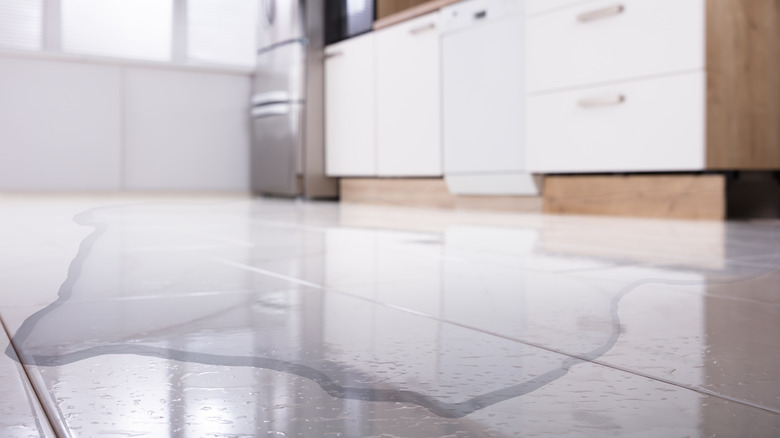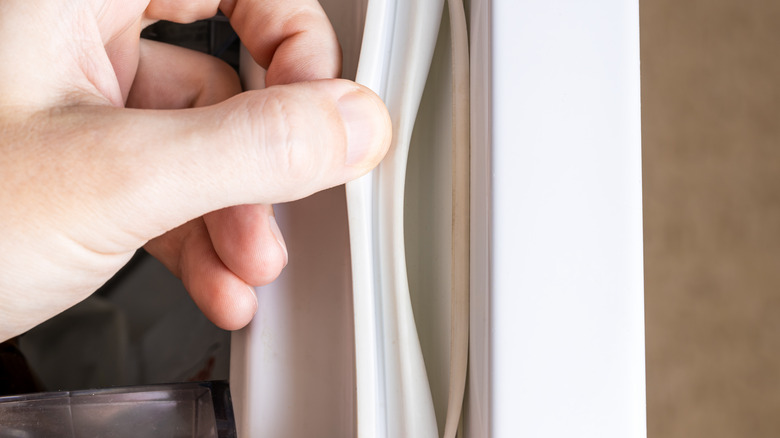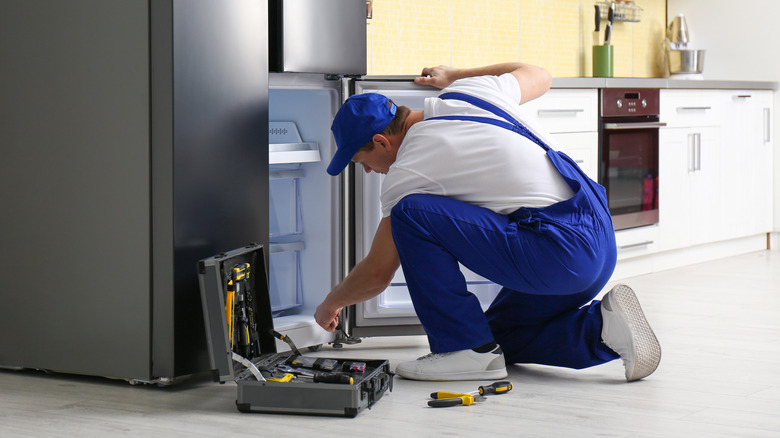Why Your Refrigerator Is Leaking, According To An Expert
When you walk into your kitchen on a cold morning, you're ready to start the day with a hot cup of coffee. Instead, you're greeted by a cold puddle of water on the floor next to your refrigerator. Unless the culprit is a melted ice cube, there may be more serious issues to address. Without proper attention, a leaking refrigerator could begin to damage other parts of the kitchen, notes Wired. Standing water can stain or warp your wood floors. It may also cause corrosion on nearby cabinets or furniture in the kitchen. In addition, a water leak can become the source of mold growth. Each of these issues can be costly to repair if they get out of hand, and they can affect the health of you and your family.
When that first leak is detected, pay close attention to see where it's coming from. If you've ruled out the stray ice cube and see that the refrigerator is the source, it's important to call a professional to help you repair it. In an exclusive interview with House Digest, Dennis Godnyuk, owner of Comfort Appliance Repair in Covington, Georgia, discusses the most common reasons why your refrigerator may be leaking. His expert advice will help you identify which issues need to be addressed in your own kitchen.
Door gasket issues
Dennis Godnyuk begins by explaining that the refrigerator door gasket might be causing the trouble. "To detect a door gasket leak, inspect the rubber seal around the opening of your fridge — if it's cracked or there are gaps between the seal and the door frame, then you may have a problem." He suggests a simple way to see if this might be the issue. "You can put a piece of paper between the seal and the frame — if you're able to pull out the paper easily, then you have a leak."
As a way to address this problem, Godnyuk recommends "replacing your existing door gasket with one made of high-quality material such as silicone or neoprene. Doing so will help create a stronger, tighter seal and prevent future problems caused by leaking refrigerators." The plumbing expert also explains that it's possible to detect this problem before it becomes the source of another leak. Going forward, he says it's important that you make sure the door seals are in good condition by inspecting them on a regular basis.
Clogged condensation drain tube
The condensation drain tube is another component that could be the source of a leaking refrigerator. "This tube normally runs underneath the refrigerator and collects condensation, which then drains out through a small hole in the cabinet or floor," Godnyuk explains. "If this tube becomes clogged with lint, dirt, or other debris, water will be unable to properly drain away from your fridge and will eventually cause leaks." This is another issue that can be avoided with some regular maintenance. "To prevent this problem from occurring, check your drain tube regularly for signs of buildup and clear it out if necessary. Additionally, you may want to invest in a preventive measure such as a condensation protector."
Godnyuk explains that if the condensation drain tube is already clogged and causing a leak, a simple technique may be all it takes to solve the problem. "Try cleaning it with hot water and a pipe cleaner before replacing it entirely," he suggests. Understanding where this tube is and how to maintain it could potentially save you the expense of greater repairs in the future.
Water supply line problems
Finally, Godnyuk points out that the refrigerator leak may be the result of a problem with the water supply line. "When the flexible tubing that runs between the water valve and the refrigerator is damaged or cracked, it can cause a leak." He goes on to explain that sometimes these cracks are caused by corrosion or simply old age. Another potential issue could be that the tubing was incorrectly installed in the first place.
Just like with the other problems, Godnyuk advises that it's possible to keep the water supply line from causing a leak by keeping an eye on things and making note of normal wear and tear. "If you notice any cracks or holes in the tubing, replace it as soon as possible," he recommends, further noting that there's a tool you can buy that will be useful in an emergency. "Consider investing in a special shut-off valve that will automatically turn off the flow of water if a leak occurs," he says. This valve can stop a major disruption before excess water collects in your kitchen and causes damage to your floors or cabinets. His last word of advice is to seek help with this kind of project. "Make sure your water supply line is installed properly by an experienced plumber," he says. Following these tips and seeking professional help when necessary will help you prevent any further leaks in the future.



